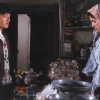In a small village wrapped by the emerald arms of the mountain, the morning mist would glide like a soft prayer over the trees. The river sang gently, and three friends sat by its edge Boy, Paul, and Mamat, watching the reflection of sunlight dance on the water. To them, the forest was not just a stretch of land. It was memory, breath, and life itself.
But life was changing.
The old trees were falling. The songs of birds had quieted. The forest, once alive and unbroken, was slowly fading into silence.
"Our forest is dying," Boy said, his voice heavy.
Boy was the dreamer, the one who believed the forest could be saved through conviction alone. "Protecting it is our duty," he often said. "If not us, then who?"
Paul, calm and thoughtful, nodded. "We need action. Awareness. Education. Let's start a movement, teach people, involve the youth, plant trees."
Mamat, who had been quietly tossing stones into the river, finally spoke. "You're both right," he said with a small smile, "but you're missing something."
He pointed toward the distant village. "People cut trees not because they hate the forest. They do it because they're hungry. You can't tell a man to love trees when his children haven't eaten. If the forest doesn't feed them, they'll tear it down to survive."
Paul frowned. "So what's your plan?"
Mamat leaned forward, his eyes steady. "We make the forest feed them again. We turn protection into livelihood. Let's grow coffee, harvest honey, sell bamboo, create forest-based crafts even eco tours. If people can live with the forest, they'll never destroy it."
Boy was silent for a long time. The wind rustled the leaves above them as if agreeing with Mamat's words.
Months later, their dream took shape. They called it "The Forest That Grew Hope."
Paul became the strategist writing proposals and securing small grants. Boy became the voice rallying youth and schools to join. And Mamat became the heart training villagers to plant coffee and tend bees among the trees.
The early days were full of doubt. "The forest won't feed us," people said. "We need quick money, not promises."
But Mamat didn't argue, he worked. He dug the first hole, planted the first seed, built the first beehive. Slowly, others followed. An old farmer joined. Then his neighbors. Then the whole village.
Two years later, the hills were alive again blanketed with young trees, buzzing with bees, filled with laughter and hope. The air smelled of earth and roasted coffee. Children ran between rows of saplings, their feet muddy but their eyes bright.
Standing by the edge of the forest, Boy smiled as he watched the villagers carry jars of honey to their new cooperative. "You were right, Mat," he said softly. "The forest isn't just about trees, it's about people."
Paul nodded. "We didn't just grow a forest," he said. "We grew a future."
Mamat smiled, gazing at the green canopy. "The forest and its people," he whispered, "are two sides of the same leaf. One cannot live without the other."
The sun sank behind the mountain, painting the trees gold. The forest seemed to hum, alive, grateful, eternal. And in that moment, it wasn't just a place of roots and leaves.
It was proof that hope, when nurtured, can grow as strong as any tree.
Follow Instagram @kompasianacom juga Tiktok @kompasiana biar nggak ketinggalan event seru komunitas dan tips dapat cuan dari Kompasiana. Baca juga cerita inspiratif langsung dari smartphone kamu dengan bergabung di WhatsApp Channel Kompasiana di SINI







